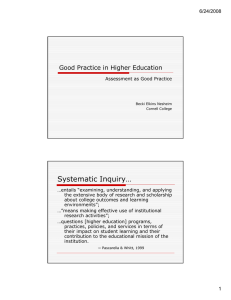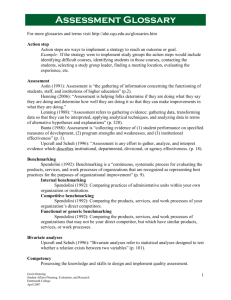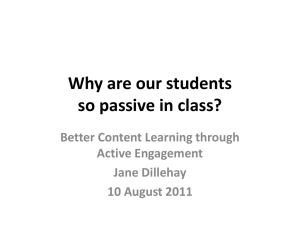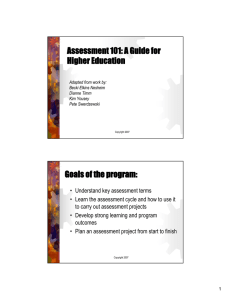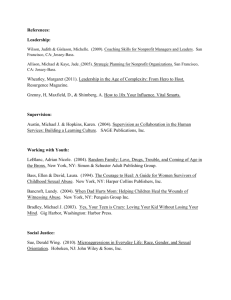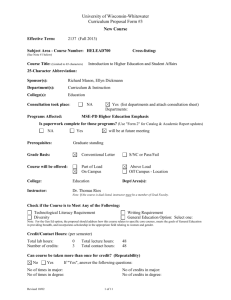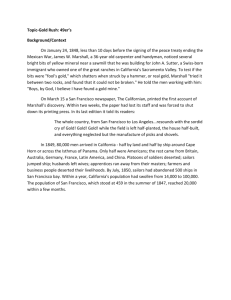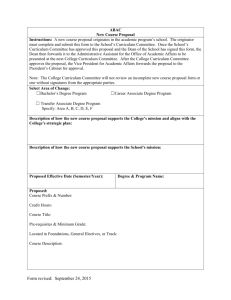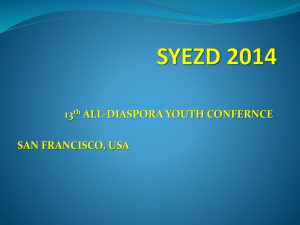HELEAD 715: Assessment in Student Affairs
advertisement
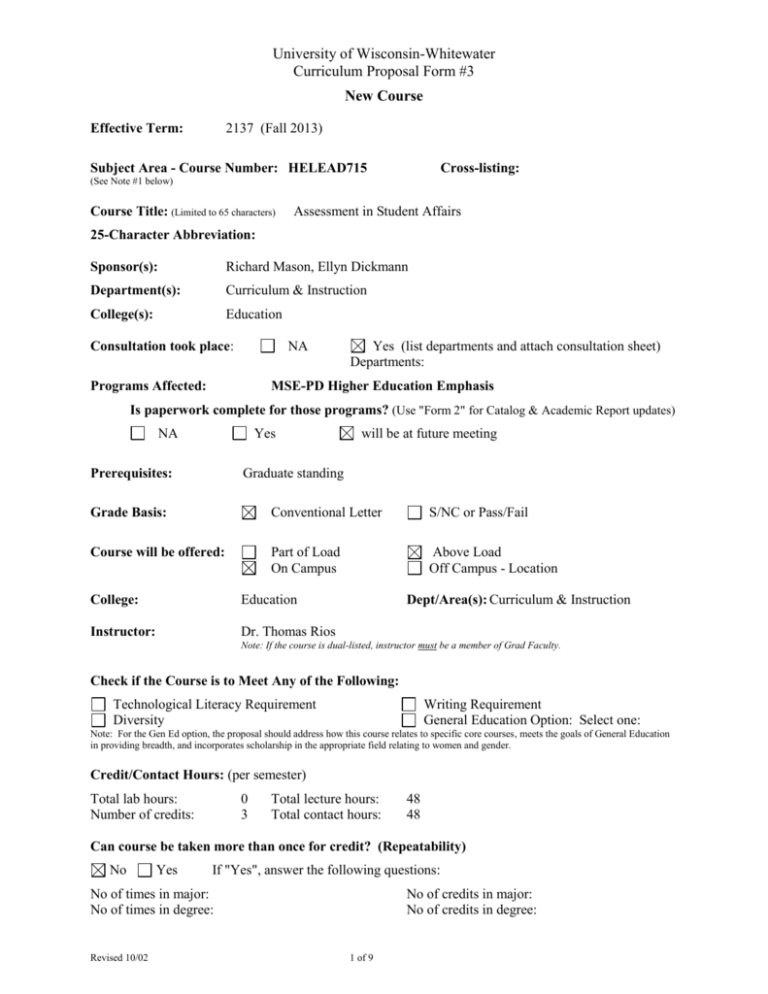
University of Wisconsin-Whitewater Curriculum Proposal Form #3 New Course Effective Term: 2137 (Fall 2013) Subject Area - Course Number: HELEAD715 Cross-listing: (See Note #1 below) Course Title: (Limited to 65 characters) Assessment in Student Affairs 25-Character Abbreviation: Sponsor(s): Richard Mason, Ellyn Dickmann Department(s): Curriculum & Instruction College(s): Education Consultation took place: NA Programs Affected: Yes (list departments and attach consultation sheet) Departments: MSE-PD Higher Education Emphasis Is paperwork complete for those programs? (Use "Form 2" for Catalog & Academic Report updates) NA Yes Prerequisites: will be at future meeting Graduate standing Grade Basis: Conventional Letter S/NC or Pass/Fail Course will be offered: Part of Load On Campus Above Load Off Campus - Location College: Education Instructor: Dr. Thomas Rios Dept/Area(s): Curriculum & Instruction Note: If the course is dual-listed, instructor must be a member of Grad Faculty. Check if the Course is to Meet Any of the Following: Technological Literacy Requirement Diversity Writing Requirement General Education Option: Select one: Note: For the Gen Ed option, the proposal should address how this course relates to specific core courses, meets the goals of General Education in providing breadth, and incorporates scholarship in the appropriate field relating to women and gender. Credit/Contact Hours: (per semester) Total lab hours: Number of credits: 0 3 Total lecture hours: Total contact hours: 48 48 Can course be taken more than once for credit? (Repeatability) No Yes If "Yes", answer the following questions: No of times in major: No of times in degree: Revised 10/02 No of credits in major: No of credits in degree: 1 of 9 Proposal Information: (Procedures for form #3) Course justification: An increasing number of students seeking graduate-level preparation for careers in higher-education leadership in areas such as residence life, recruitment and retention, and academic support services have sought admission to the MSE-PD Educational Leadership program. This course is one of a set of five courses being created specifically to address the needs of that group of students that will form part of a distinct emphasis in Higher Education Leadership. The population for whom these courses are intended is different from the students admitted to UW-Whitewater’s Counselor Education program – Higher Education track in that they do not have a particular interest in counseling and the positions for which they are preparing do not require them to complete a nationally-accredited program in counseling. Relationship to program assessment objectives: This course addresses CAS Standards (Part 5b.5) for master’s-level student affairs professional preparation programs related to assessment, evaluation, and research. This course also contributes to the achievement of MSE-PD program goals of enhancing students’ proficiency in research about higher education leadership, their understanding of professional practice in higher education, and the ability to communicate with others about, and advocate for, informative and equitable assessment practices in higher education (voice). Budgetary impact: Courses in the Higher Education Leadership emphasis will initially be taught by UW-Whitewater administrators funded by program revenue. As the program expands, the course will be taught by qualified adjunct instructors on a self-supporting basis. The population served by these courses does not overlap with the population enrolled in other master’s emphasis areas at UW-Whitewater, and availability of these courses should not affect enrollment in existing courses other than the common core courses of the MSE-PD, which should increase as more students enroll in the Higher Education Leadership emphasis. Course description: (50 word limit) This course provides students with an overview of the assessment and evaluation processes that allow Student Affairs professionals to develop assessment approaches that gather, analyze, and interpret information to improve institutional, departmental, and divisional effectiveness. Both qualitative and quantitative approaches to assessment will be examined with an emphasis on pragmatic application. If dual listed, list graduate level requirements for the following: 1. Content (e.g., What are additional presentation/project requirements?) 2. Intensity (e.g., How are the processes and standards of evaluation different for graduates and undergraduates? ) 3. Self-Directed (e.g., How are research expectations differ for graduates and undergraduates?) Course objectives and tentative course syllabus: As a result of this class, students will be able to: 1. Understand the importance of program assessment and explore the complexities of conducting research in Student Affairs by completing assignments, participating in class discussions, and completing group projects. 2. Understand and apply research methods such as: Qualitative, Quantitative, Mixed-Method, Action Research, and Outcome-based research by completing written assignments. Revised 10/02 2 of 9 3. Apply results of assessment and evaluation to improve program effectiveness in a mock learning scenario. 4. Understand ethical and legal considerations for assessment and evaluation by writing an assessment/evaluation report and tailoring it to fit various audiences Bibliography: (Key or essential references only. Normally the bibliography should be no more than one or two pages in length.) The following bibliography provides the foundation for the above-named course: Banta, T. W. (Ed.). (2004). Hallmarks of effective outcomes assessment. San Francisco, CA: Jossey-Bass. Banta, T. W., Lund, J. P., Black, K. E., & Oblander, F. W. (1993). Assessment in practice: Putting principles to work on college campuses. San Francisco, CA: Jossey-Bass. Bresciani, M. J., Zelna, C. L., & Anderson, J. A. (2004). Assessing student learning and development: A handbook for practitioners. Washington, D.C.: National Association of Student Personnel Administrators Creswell, J.W. (2003). Research design: Qualitative, quantitative, and mixed methods approaches (2nd Ed.). Thousand Oaks, CA: Sage Publications. Keeling, Richard P. (Ed). (2006). Learning reconsidered 2: Implementing a campus-wide focus on the student experience. Washington, DC: American College Personnel Association & National Association of Student Personnel Administrators. Keeling, Richard P. (Ed). (2004). Learning Reconsidered: A Campus-wide Focus on Student Experience. Washington, D.C.: American College Personnel Association and National Association of Student Personnel Administrators. LaFountain, R.M. & Bartos, R.B. (2002). Research and statistics made meaningful in counseling and student affairs. Pacific Grove, CA: Brooks/Cole Publishing Co. Maki, P. L. (2004). Assessing for learning: Building a sustainable commitment across the institution. Sterling, VA: Stylus Publishing. Malaney, G. D. (Ed.). (1999). Student affairs research, evaluation, and assessment: Structure and practice in an era of change. New directions for student services series, No. 85. San Francisco, CA: Jossey-Bass. Pascarella, E.T. & Terenzini, P.T. (2005). How college affects students: A third decade of research. San Francisco, CA: Jossey-Bass. Palomba, C. A., & Banta, T. W. (1999). Assessment essentials: Planning, implementing, and improving assessment in higher education. San Francisco, CA: Jossey-Bass. Revised 10/02 3 of 9 Pickering, J. W., & Hanson, G. R. (2000). Collaboration between student affairs and institutional researchers to improve institutional effectiveness. New directions for institutional research, No. 108. San Francisco, CA: Jossey-Bass. Schuh, J. H., & Upcraft, M. L., & Associates. (2001). Assessment practice in student affairs: An applications manual. San Francisco, CA: Jossey-Bass. Sudman, S., & Bradburn, N.M. (1982). Asking questions: A practical guide to questionnaire design. San Francisco, CA: Jossey-Bass. Suskie, L. (2004). Assessing student learning: A common sense guide. Bolton, MA: Anker Publishing Company, Inc. Upcraft, M. L., & Schuh, J. H. (1996). Assessment in student affairs: A guide for practitioners. San Francisco, CA: Jossey-Bass. Course Objectives and tentative course syllabus with mandatory information (paste syllabus below): Revised 10/02 4 of 9 HELEAD715 Assessment in Student Affairs (Proposed Course for UW-Whitewater’s Master of Science in Education in Professional Development — Emphasis on Higher Education Leadership) Dr. Thomas Rios Hyer Hall 200 Office Phone: 262-472-1051 E-mail: riost@uww.edu Office Hours: By Appointment Only Dr. Brent Bilodeau Hyer Hall 200 Office Phone: 262-472-1051 E-mail: bilodeab@uww.edu Office Hours: By Appointment Only Please contact Jeanne Rithamel at massj@uww.edu for an appointment to see either instructor Your success in this class is important to us. If there are circumstances that may affect your performance in this class, please let us know as soon as possible so that we may work together to develop strategies for adapting assignments to meet both your needs and the requirements of the course. The Center for Students with Disabilities (262) 472-4711 provides resources for students with disabilities. You will need to provide them with documentation of disability in order to receive official university services and accommodations. COURSE DESCRIPTION This course provides students with an overview of the assessment and evaluation processes that allow Student Affairs professionals to develop assessment approaches that gather, analyze, and interpret information to improve institutional, departmental, and divisional effectiveness. Both qualitative and quantitative approaches to assessment will be examined with an emphasis on pragmatic application. Revised 10/02 5 of 9 CONCEPTUAL FRAMEWORK Our conceptual framework, The Teacher is a Reflective Facilitator, is the underlying structure in our teacher preparation program at UW-Whitewater. This structure gives conceptual meanings through an articulated rationale to our operation. It also provides direction for our licensure programs, courses, teaching, candidate performances, faculty scholarship and service, and unit accountability. In short, our teacher education program is committed to reflection upon practice; to facilitation of creative learning experiences for pupils’ to constructivism in that all learners must take an active role in their own learning; to information and technology literacy; to diversity; and to inquiry (research scholarship) and assessment. Therefore, all syllabi pertaining to courses required for licensure reflect commitment to these underlying principles COURSE KNOWLEDGE AND LEARNING OBJECTIVES As results of this class, students will be able to: a. Understand the importance of program assessment and evaluation and the difficulties in conducting research in the Student Affairs profession b. Understand and apply research methods such as: Qualitative, Quantitative, Mixed-Method, Action Research, and Outcome-based research c. Apply results of assessment and evaluation to improve program effectiveness d. Understand ethical and legal considerations for assessment and evaluation e. Write an assessment/evaluation report tailored to various audiences REQUIRED TEXT Upcraft, M. L, & Schuh, J. H. (2008). Assessment methods for Student Affairs. San Francisco: Jossey-Bass. EXPECTATIONS FOR STUDENTS We have three expectations for students in this course: 1. Seek First to Understand, Then to be Understood. Stephen Covey in his book, The 7 Habits of Highly Effective People (1989), claims that this habit distinguishes effective people from their less effective counterparts. In higher education, we tend to put a great emphasis on critical thinking. The problem that often arises among students (and practitioners) is that they tend to first criticize an author, idea, colleague, or classmate without first seeking to understand his or her perspective. Don’t do this. 2. THNIK for yourself. (No, there isn’t a typo here.) Graduate education isn’t about memorizing facts or repeating your professor’s thoughts; it’s about taking information and transforming it into “knowledge” — by making meaning of it. We expect you to be co-learners with us — to advance Revised 10/02 6 of 9 OUR learning, and to be able to describe how the course prompts your curiosities for further independent learning. Be different: THNIK. 3. Attendance and Engagement. Students who are absent three or more sessions will not receive credit for the course. Absences up to 3 will be accounted for and potentially affect final grades. A considerable part of learning about and understanding the issues involved in higher education is through reading, discussing, and reflecting. Engagement with the materials is necessary for the success of the course. We expect you to be prepared for class and participate actively, thoughtfully, and with respectful consideration for other students. We will call upon you in class to express your thoughts and to enhance the engagement of all. Assignments: All assignments should be prepared following APA format and reflect proper grammar, punctuation, and spelling expected of graduate work. Assignments should be turned in by the due date. Any exceptions must be approved ahead of time. Late assignments will not be accepted. Major concepts (MC): Each student will develop one major concept for each assigned chapter from Upcraft and Schuh, and any articles assigned. A major concept is one short paragraph that provides (a) important guidance to student affairs practitioners related to assessment and (b) how the student sees it impacting his/her own professional career. Class presentations on readings: At the beginning of each class period a student will be chosen at random to present a short, ten-minute presentation on the one of the readings for the week and lead the class in a discussion of same. Article critiques: Students will select empirically based refereed journal articles to analyze. A critique is to discuss, analyze and evaluate not to summarize the article. A critique focuses on how? why? and how well? Focus the analysis on the questions provided by your instructor. Assessment project: Students will choose from self-selected Division of Student Affairs assessment project. (See instructions in separate handout.) Take home quizzes: Students will be given an opportunity to review assessment and research concepts and will be able to use outside sources to answer the questions. Class Participation: Participation includes attendance, punctuality, and balanced involvement in class discussions. IRB Certification: IRB Training Initiative. Course is a web-based ethics training course for those conducting research with human subjects. Successful completion of the course will provide students a good background in and reasons for good practice in research and assessment.) Grading: Activity: Major concepts (MC) Class presentations Class participation Quantitative article critique Qualitative article critique Revised 10/02 100 100 100 125 125 7 of 9 Take home quizzes @ Assessment project Total points 100 each 250 1000 Grading Scale: 94-100 = A 87-93 = A/B 80 – 86 = B 73-79 = B/C 72 or < The University of Wisconsin-Whitewater is dedicated to a safe, supportive and non-discriminatory learning environment. It is the responsibility of all undergraduate and graduate students to familiarize themselves with University policies regarding Special Accommodations, Academic Misconduct, Religious Beliefs Accommodation, Discrimination and Absence for University Sponsored Events (for details please refer to the Schedule of Classes; the “Rights and Responsibilities” section of the Undergraduate Catalog; the Academic Requirements and Policies and the Facilities and Services sections of the Graduate Catalog; and the “Student Academic Disciplinary Procedures (UWS Chapter 14); and the “Student Nonacademic Disciplinary Procedures" (UWS Chapter 17). COURSE SCHEDULE Topic Course overview and expectations; Team selection; Introduction to Course Concepts Program Assessment/Evaluation: What is it? Why is it necessary? Why is so little being done? Client Program/Service Usage, Needs Assessment, and Satisfaction Surveys Client Program/Service Usage, Needs Assessment, and Satisfaction Surveys Student Learning Outcomes — Moving beyond Satisfaction Surveys Methodologies: Qualitative, Quantitative, Mixed-Method, and Action Research Reading None Assignment Chapters 1 & 2 in Upcraft & Schuh; Healy (PDF) Chapters 5, 6, and 7 in Upcraft & Schuh Assessing the Impact of Counseling & Health Care Services Chapter 10 in Upcraft & Schuh; Student Voice: Capturing Students’ Learning Chapters 3 & 4 in Upcraft & Schuh Written responses to Questions 1 and 2 Gary Harms & Therese Kennedy Visit ETHICS, IRB Surveys; Conducting Focus Groups Materials Provided on Recreational Sports The Belmont Report; Benchmarking: Comparing Performance Across Organizations Measuring Effectiveness Against Chapter 11 in Upcraft & Schuh; NSSE Chapter 12 in Upcraft & Revised 10/02 8 of 9 Written responses to Questions 3 and 4 Written responses to Questions 5 and 6 Written responses to Questions 7 and 8 Written responses to Questions 9 and 10 Completion of CITI Course in the Protection of Human Research Subjects: http://www.citiprogram.o rg/ (Basic Course only) Professional Standards Team Project Team Project Team Project; Case Study/Essay Practice Team Presentations Schuh; Bresciani (PDF); Readings TBA Readings TBA Team Written Project Case Study/Essay EVALUATION AND GRADING Element Question 1 –10 Responses CITI Course Team Report Team Presentation Attendance/Participation Case Study/Essay Points 100 50 250 50 50 100 600 UNIVERSITY OF WISCONSIN – WHITEWATER POLICIES The University of Wisconsin-Whitewater is dedicated to a safe, supportive and non-discriminatory learning environment. It is the responsibility of all undergraduate and graduate students to familiarize themselves with University policies regarding Special Accommodations, Misconduct, Religious Beliefs Accommodation, Discrimination and Absence for University Sponsored Events. (For details please refer to the Undergraduate and Graduate Timetables; the “Rights and Responsibilities” section of the Undergraduate Bulletin; the Academic Requirements and Policies and the Facilities and Services sections of the Graduate Bulletin; and the “Student Academic Disciplinary Procedures” [UWS Chapter 17]). Revised 10/02 9 of 9
